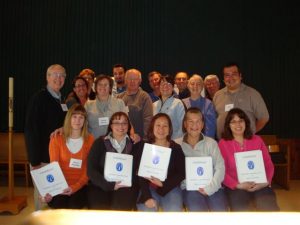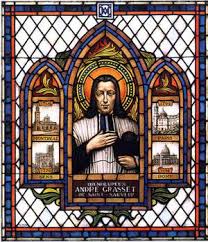HOMILY WEEK 22 03 – Year II
Co-workers Building the Kingdom of God:
Optional Memorial of Blessed André Grasset
(1 Cor 3:1-9; Ps 33; Lk 4:38-44)
*******************************************
A key feature of my first year of ministry in northern Saskatchewan was introducing the Christopher Leadership Course to the north, which in turn convinced me of the importance of team ministry.

Grads in Thompson MB
As instrumental as that course was in the personal growth of hundreds of people, and some very exciting and formative team ministry for those giving it, that pales compared to the team ministry St. Paul invites us into today – to be co-workers with others in building up the kingdom of God through a mature spirituality.
This liturgy brings together two realities very close to my heart – team ministry and the kingdom of God. My motto as a bishop is Regnum Dei Intra Vos – the kingdom of God is among you, from Luke 17:21. That passage is the only one in the New Testament that has Jesus saying not just we are close to the kingdom, or the kingdom is near, but more radically, the kingdom of God is within us, among us. Building up that kingdom in all the ways I can has been a motivation from the beginning. In my first year of ministry I even composed a hymn entitled To Build The Peaceful Kingdom, whose words and melody I can hardly recall now.
The readings today touch on some tools for building that kingdom with a mature spirituality I have found essential over the years. The first is mentioned by the psalmist and modelled by Jesus himself – contemplative prayer. For the psalmist, we are to “wait for the Lord,” a good description of contemplative prayer. In the gospel, Jesus “departed” early in the morning to commune with the Father, to spend time in an intimate relationship with his Father. Isn’t it amazing how we can be too busy to pray, yet Jesus wasn’t. Our ministry, to be truly effective and fruitful, should flow out of our intimate relationship with Jesus and with the Father, as did his.
Practicing Lectio Divina, resting in the presence of the Lord, is a great way to enter more deeply into contemplative prayer. Lectio is reading a passage of scripture. In Meditatio we ponder that word, asking ourselves what God is trying to communicate to us through that word. In Oratio, we pray with that word for our needs and the needs of the world. The final stage is Contemplatio, the most challenging stage. Here we set all thoughts and feelings aside, perhaps use a mantra from the word we have pondered to center ourselves, and try to just be in the Lord’s presence. A biblical model for this prayer is Mary of Bethany, who according to Thomas Keating, was not so much listening to the words Jesus was speaking, as she was aware she was in the presence of the Word of God. Big difference, and a key to contemplative prayer.
A second major element of building up the kingdom of God is being on a healing journey. In the gospel, Jesus heals Peter’s mother-in-law, then lays hands on and heals all those in the community afflicted in some way with illness. The need for healing was also apparent to St. Paul, who chides the Corinthians for being immature in their faith, for not being ready for real spiritual food. Interestingly, he articulates two specific signs of immaturity – arguments and jealousy. These symbolize the two ways they needed to grow in maturity – receive forgiveness for their sins (arguments) and healing for their negative attitudes and defects of character (jealousy). We can apply that same teaching to ourselves.
It is also interesting that the demons Jesus cast out called him the Son of God and knew he was the Messiah. As Son of God and as Messiah, Jesus had a two-fold role – to redeem and to sanctify, to forgive and to heal. We can come to him to receive forgiveness for all our sins, and more than that, to receive healing for our sinfulness (that which makes us sin – our painful emotions and negative attitudes). Forgiven and healed, we can be much more mature co-workers building up the Kingdom of God.
The gospel ends with Jesus stating he must proclaim the good news of the kingdom of God to the other cities also. That is our task as well – each in our own way, to share with others how our relationship with Jesus has been good news for us – has led us to experience freedom from all guilt and fear through forgiveness, and transformed us into greater Christlikeness, peace and joy through inner healing.
 Today the Church invites us to honor Blessed André Grasset, who was born in Montreal inn 1758. His family had come to Quebec in 1749, but they returned to France after the Battle of Quebec. Ordained a priest, André was serving at the cathedral in Sens when the French Revolution began. Refusing to sign the Civil Constitution of the Clergy, he and many other priests and religious were imprisoned in 1792 and martyred. As one of a group of 190 martyrs, André was beatified in 1926. The following year a college in his name was opened in Montreal.
Today the Church invites us to honor Blessed André Grasset, who was born in Montreal inn 1758. His family had come to Quebec in 1749, but they returned to France after the Battle of Quebec. Ordained a priest, André was serving at the cathedral in Sens when the French Revolution began. Refusing to sign the Civil Constitution of the Clergy, he and many other priests and religious were imprisoned in 1792 and martyred. As one of a group of 190 martyrs, André was beatified in 1926. The following year a college in his name was opened in Montreal.
The Eucharist is a team-building event – a communing with the unconditional love of the Father made present through the selfless give of Jesus’ very life. To celebrate it sincerely is to receive forgiveness and healing, and to be empowered to be more mature co-workers building up the kingdom of God.



